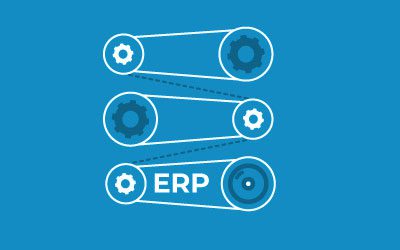Lean manufacturing comprises a collection if ideas and practices aimed at minimizing waste while simultaneously improving product quality. It’s often implemented as a complete, systematic approach to running a manufacturing operation. ERP software for manufacturing can help you realize the benefits of lean manufacturing.
The software alone does not guarantee this outcome, however. Rather, when companies deploy ERP software in accordance with well thought-through and company-specific lean practices, results start to emerge. To illustrate how ERP software can support the success of a lean manufacturing effort, we thought it would be worthwhile to highlight the applicability of software to seven critical principles in the lean manufacturing discipline.
What is Lean Manufacturing?
To understand lean manufacturing, it’s useful to know where it came from. Though the words “lean manufacturing” have only been with us since the late 1980s, the lean philosophy actually originated in the early days of Toyota, in the mid-1930s. At that time, car-manufacturing was relatively wasteful and inefficient. It’s not that people weren’t trying to make car assembly lines efficient. The problems stemmed from poor assumptions about how things should be made.
Kiichiro Toyoda, the legendary founder of Toyota, was one to challenge prevailing ideas about how to make cars. He applied a new set of principles to manufacturing. His ideas evolved and matured into what we now call lean manufacturing. Among other things, Toyoda identified seven areas of waste that contributed to high costs, low quality and inefficient operations:
- Transport, e.g. moving items that are not needed for the actual processing
- Inventory, e.g. keeping inventory at a minimum, including components, work in progress and finished goods
- Movement, e.g. wasteful motions of people or equipment
- Waiting, e.g. delays between production steps
- Overproduction, e.g. making goods ahead of demand
- Over-processing, e.g. excessive work due to poor product or tool design
- Defects, e.g. the work required to inspect for defects or worse, recalling them after shipment
Each of these forms of waste has a negative impact on product quality as well profitability. For example, overproduction can tie up cash in goods that may never be sold. Similarly, stockpiling components in advance of manufacturing not only ties down cash, it can conceal defects that will appear later in the manufacturing cycle. In contrast, the “just in time” approach, which involves receiving components close to assembly time, enables the manufacturer to catch defects in real time.
How Manufacturing ERP Software Helps Manufacturers Avoid the Seven Wastes
Used the right way, manufacturing ERP software, can help you avoid, or at least reduce, the seven wastes of traditional manufacturing:
- Transport—Software enables you to track the movement of components across the entire manufacturing process.
- Inventory—Stay on top of inventory and procurement in real time, aligning component delivery with manufacturing operational plans.
- Movement—Optimize your manufacturing operation using process analysis and planning.
- Waiting—Organize your production schedule to minimize waiting.
- Over-production—Estimate demand using data analytical tools in the software, making it possible to avoid over-production.
- Over-processing—Manage the production process at a granular level to detect and then reduce over-processing.
- Defects—Use reporting and data visualization to determine root causes of defects, so they can be remediated.
All of these actions contribute to the ultimate ethos of lean manufacturing, which is continuous improvement. The idea that propelled Toyota into one of the world’s largest and most respected brands for quality was that everything can be done better—always. The lean manufacturing practice means constant observation and improvement. With data analytics and other specialized tooling, manufacturing ERP gives your organization this potential.
To arrange a demonstration of Acumatica cloud ERP software for manufacturing and discuss how it can drive lean manufacturing at your business, let’s talk.


